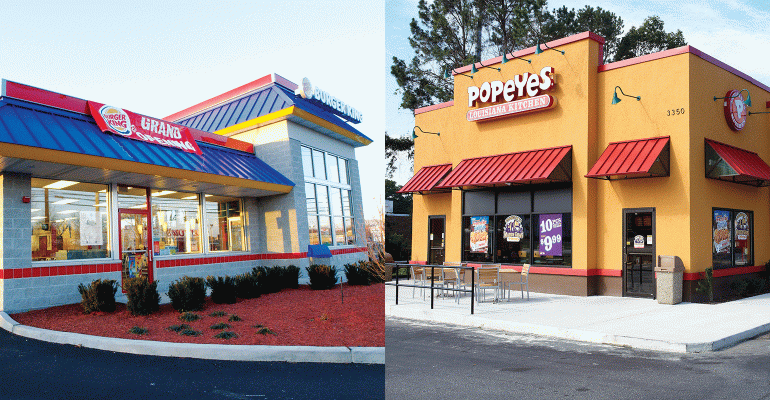After months of flirting, Restaurant Brands International Inc. and Popeyes Louisiana Kitchen Inc. finally agreed to tie the knot this week, with the Burger King owner agreeing to pay $1.8 billion for the fried-chicken chain.
RBI owns Burger King and doughnut-and-coffee chain Tim Hortons. Popeyes will add a third leg to the stool.
The deal cements RBI’s reputation as a burgeoning force in the restaurant industry, a company smaller only than McDonald’s Corp. and Yum! Brands Inc. in terms of system sales. The deal will also make RBI the fifth-largest restaurant company in terms of total global unit count, with 23,000 locations.
It’s a typically aggressive deal for RBI, which targeted Popeyes for months and then bid a strong price for the company. The agreement, announced on Tuesday, represents another win for Restaurant Brands CEO Daniel Schwartz.
“He’s the engineer,” said Guillermo Perales, a Dallas-based franchisee of Burger King and Popeyes. “He’s built one of the largest restaurant companies in the world. He’s done an outstanding job.”
He’s also paying a high price. At $79 per share, RBI is paying is a 27-percent premium over its 30-day average as of Feb. 10, and the $1.8 billion represents a multiple of 19 times forward cash flow.
For those numbers to work over the long term, RBI is betting that it can apply the same rapid-growth playbook at Popeyes that it used at Burger King, and has started to employ at Tim Hortons. It’s a playbook put in place when 3G Capital first acquired Burger King in 2010.
Under 3G, Burger King sold all company locations and worked to aggressively develop international markets. At the time, Burger King was adding 170 locations a year, CFO Joshua Kobza said on a conference call Tuesday.
Over the past six years, Burger King has added 735 locations per year. Put another way, Burger King’s unit count grew by more than 28 percent between 2010 and 2016, to 15,738 locations.
Popeyes is growing at a rate similar to Burger King back in 2010. RBI wants to ramp that up.
“The strategy will be much the same: To grow the size of the brand by working with existing and new franchisees,” Kobza said.
To be sure, Popeyes is in a better spot than Burger King was in 2010, at least domestically. The company is already fully franchised except for 50 locations in two markets.
Franchisee relations are strong, and the chain’s restaurants are largely renovated. Burger King, on the other hand, is still working through a major system-remodeling project.
Popeyes has also seen several years of same-store sales growth, and systemwide sales at Popeyes have grown at least 8 percent every year since 2008, according to SEC data. The chain’s domestic system sales have doubled over that time, according to NRN Top 100 data.
Popeyes has 2,000 domestic locations, less than half the size of rival KFC — meaning the chain has room for growth. And its focus on a New Orleans-inspired menu of fried chicken and other items with spicier flavor profiles fits in with consumer tastes.
“Popeyes’ management team refocused on its roots in New Orleans,” Schwartz said. “It differentiated itself with a highly distinctive brand positioning that permeates every touch point.”
But the real payoff will take place in international markets. Nearly all of the new units Burger King has added since 2010 have been built outside the U.S., where a competitive industry has recently made growth more of a risk for legacy chains.
Popeyes has 600 locations in international markets, giving it a head start. Executives also noted that the company has recently reached several development agreements.
Restaurant Brands “appears to be a good strategic match for Popeyes, as it will further enhance the brand’s global growth opportunities with its large family of franchisees,” Jefferies analyst Alexander Slagle wrote in a note on Tuesday.
Chicken is also a proven menu item in other countries, thanks to the success of KFC in global markets.
“Chicken is a popular category across the world,” Kobza said. “And Popeyes is a high-quality brand.”
RBI’s playbook also includes cuts in general and administrative spending. The company famously cut staff and various executive perks after taking over Burger King and then merging with Tim Hortons. Investors have faith the company can use that playbook effectively: RBI’s stock rose nearly 7 percent on Tuesday.
Contact Jonathan Maze at [email protected]
Follow him on Twitter: @jonathanmaze





